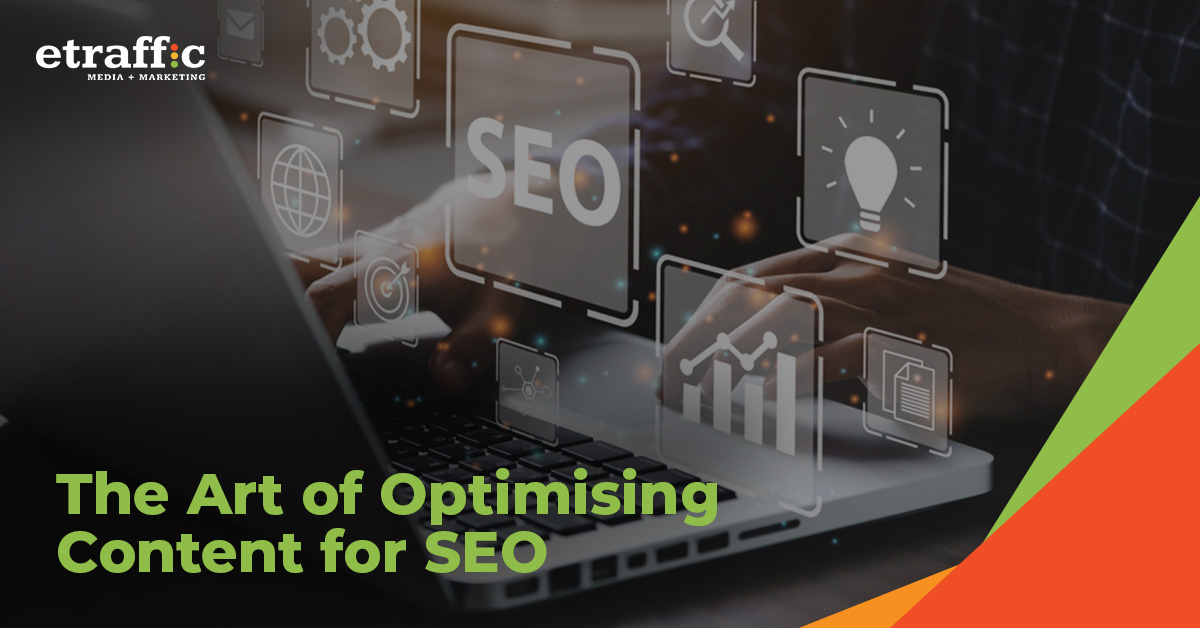![]() Posted by Cameron Francis
on
12 Oct , 2023
in
SEO Tips
Posted by Cameron Francis
on
12 Oct , 2023
in
SEO Tips

In the vast landscape of the internet, where millions of websites are vying for attention, search engine optimisation (SEO) has emerged as the linchpin of online visibility. It’s not merely a technical endeavour but an art form that involves crafting content to resonate with both algorithms and human readers.
In today’s blog, we’ll take a look at the intricacies of SEO, exploring the key techniques and strategies that make up the art of optimising content for search engines.
SEO, or search engine optimisation, is the practice of enhancing a website’s visibility on search engine results pages (SERPs). It involves a series of techniques and strategies aimed at improving a website’s ranking in search engine algorithms.
The goal is to ensure that when users search for relevant keywords or phrases, the website appears higher in the search results, increasing the likelihood of attracting organic traffic.
The significance of SEO cannot be overstated in today’s digital age. It is the gateway to online success for businesses and individuals alike. Whether you’re running an e-commerce store, a personal blog, or a corporate website, SEO is the key to getting noticed in the vast ocean of the internet.
SEO encompasses a range of components, each playing a vital role in optimising online content. The six fundamental pillars of SEO are as follows:
At the heart of SEO lies the strategic use of keywords. Keywords are the phrases or terms that users type into search engines when looking for information, products, or services. Effective keyword research is the foundation of any successful SEO strategy.
To identify the right keywords for your content, you can use various tools and techniques. Google’s Keyword Planner, for instance, helps you discover relevant keywords and provides insights into their search volume and competition. Other tools, like SEMrush and Ahrefs, offer comprehensive keyword research features.
The Importance Of Titles and Headings: Titles and headings are the first things users see when they land on your page. Crafting compelling and SEO-friendly titles and headings is essential for grabbing the reader’s attention and improving search engine rankings.
Creating High-Quality and Engaging Content: Content is king in the world of SEO. High-quality, informative, and engaging content not only attracts readers but also impresses search engine algorithms. Google and other search engines reward well-written and valuable content with higher rankings.
Optimising Meta Descriptions and URLs: Meta descriptions provide a brief summary of your content on SERPs. They should be concise, descriptive, and contain relevant keywords. Additionally, creating clean and descriptive URLs is crucial for both SEO and user experience.
Leveraging Keywords Strategically: Keyword placement within your content is essential. Keywords should be used naturally and strategically in headings, subheadings, and throughout the text. However, keyword stuffing should be avoided at all costs, as it can lead to penalties from search engines.
The Role of Internal Linking: Internal linking involves connecting pages within your website through hyperlinks. It enhances the user experience by allowing readers to navigate easily between related content. It also helps search engines understand the structure of your website and the relationships between different pages.
Building Quality Backlinks: Backlinks, also known as inbound links, are links from other websites that point to your content. High-quality backlinks from reputable sources are like votes of confidence in your content’s credibility. They signal to search engines that your content is valuable and worth ranking higher in search results.
Guest Posting and Content Sharing: Guest posting on other websites and sharing your content on social media platforms are effective off-page SEO strategies. They help you reach a wider audience and attract more traffic to your site. When your content is shared by others, it signals its relevance and authority to search engines.
Social Media and Its Impact on SEO: While social media itself may not directly impact search engine rankings, it plays a vital indirect role. Social media platforms are excellent channels for promoting your content, increasing its visibility, and driving traffic to your website. The more your content is shared on social media, the more likely it is to attract backlinks and mentions from other websites, which can positively affect your SEO.

With the increasing use of smartphones and tablets, mobile optimisation has become a critical aspect of SEO. Search engines prioritise mobile-friendly websites in their rankings. Therefore, ensuring that your content is responsive and accessible on mobile devices is essential for SEO success.
Tips for Ensuring Mobile Optimisation
Site Speed and Its Impact on SEO: Site speed is a crucial factor in SEO. Slow-loading websites not only frustrate users but also receive lower rankings from search engines. Optimising your website’s speed by reducing image sizes, using browser caching, and minimising HTTP requests can significantly improve on page SEO performance.
XML Sitemaps and Robots.txt Files: XML sitemaps help search engines crawl and index your website more efficiently. By creating and submitting a sitemap to search engines, you can ensure that your content gets discovered and ranked appropriately. On the other hand, the robots.txt file allows you to control which parts of your website search engines can access and crawl.
Structured Data Markup for Rich Snippets: Structured data markup, also known as schema markup, enhances your search engine listings by providing additional information in the form of rich snippets. Rich snippets can include star ratings, product prices, event dates, and more. Implementing structured data markup can make your listings more attractive and informative to users, potentially increasing click-through rates.
Measuring the success of your SEO efforts is essential to refine your strategy and achieve better results. Various tools and analytics platforms can help you monitor and track SEO performance.
Google Analytics, Google Search Console, and third-party tools like Moz and SEMrush are valuable resources for gathering data on organic traffic, click-through rates, keyword rankings, and more.
To assess SEO performance, pay close attention to key metrics:
By regularly analysing these metrics, you can gauge the effectiveness of your SEO efforts and make data-driven improvements to your content and strategy.
In the ever-evolving landscape of digital marketing, mastering the art of optimising content for SEO is essential for online success. Understanding the basics of SEO, conducting thorough keyword research, implementing on-page and off-page optimisation strategies, ensuring mobile-friendliness, addressing technical SEO considerations, and tracking performance metrics are all critical aspects of a successful SEO strategy.
The art of SEO goes beyond algorithms; it’s about creating valuable, user-focused content that resonates with your audience while meeting the technical requirements of search engines. By combining the science and art of SEO, you can enhance your online visibility, attract organic traffic, and achieve your digital marketing goals.
Remember that SEO is an ongoing process, and staying updated with the latest trends and best practices is key to maintaining your competitive edge in the digital landscape.
At ETRAFFIC, we can help you unlock the full potential of your online presence with our expert SEO services and assist you in taking your content to the top of search engine rankings today!
Please call us at ETRAFFIC today at 1300 887 151 or book a free strategy session below.
BOOK A FREE STRATEGY SESSION TODAY